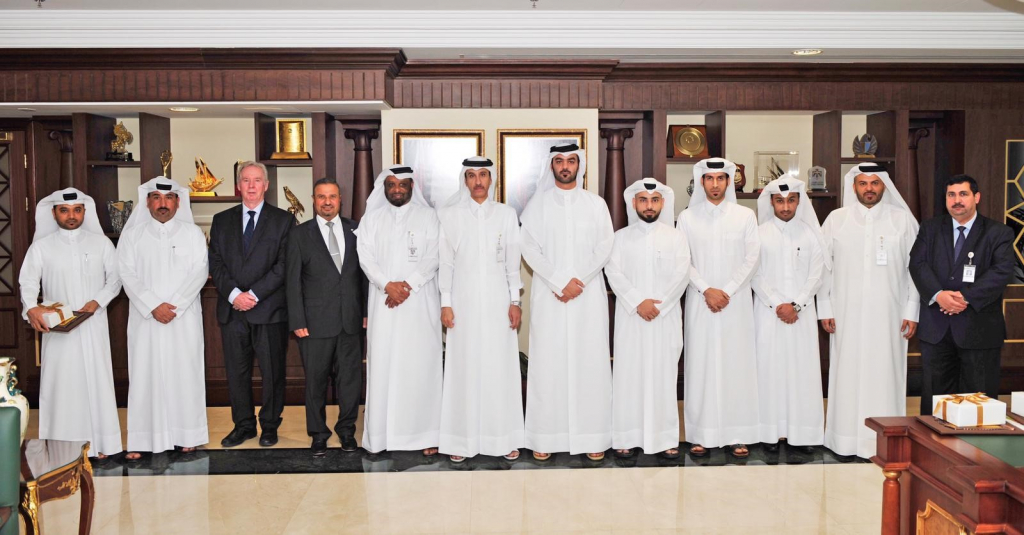Qatar Customs invests in staff development
18 June 2021
By Qatar General Authority of CustomsQatar Customs is offering its staff new opportunities to further their education and ensure they are well equipped to take on complex projects or managerial positions. This article introduces these new educational programmes and reveals some of the lessons learned in establishing them.
Until recently, staff working for Qatar’s General Authority of Customs (hereafter referred to as Qatar Customs) could enhance their knowledge and skills only by following training provided by the Customs Training Centre and the WCO Secretariat. Although an induction programme was in place for new recruits and a career development path was defined for each employee, the Administration decided that this approach was no longer sufficient to satisfy the demands of the Government and of traders.
In Qatar, Customs is seen as having an important role to play in ensuring sustainable economic development and in achieving the Qatar National Vision 2030 and the Qatar National Development Strategy. This Strategy explores ways to improve the performance of public sector institutions, i.e., ways to be more efficient, innovative, relevant, transparent, accountable, results-orientated and customer-focused. It also underlines that Customs not only ensures traders’ compliance with regulatory requirements, but also plays an important part in supporting inward investment and fostering international trade and travel.
Qatar Customs realized that to meet the requirements of the Strategy, it needed professionals with a broad knowledge of the environment in which they operate, a deep understanding not only of Customs matters but also of other disciplines, and the ability to recognize new and emerging trends, identify opportunities and translate them into practice.
In order to offer its employees the opportunity to acquire such knowledge and skills, Qatar Customs established a partnership with the Community College of Qatar (CCQ) and the Centre for Customs and Excise Studies (CCES) at Charles Sturt University, Australia. CCES had already partnered with a number of educational institutions around the world to jointly develop and deliver tailor-made educational programmes that meet the WCO Professional Standards requirements, while CCQ is acknowledged as a leading institution for educating public sector officials in the Middle East.
In 2010, Qatar Customs, CCQ and CCES together conceived a development pathway for Customs officers, with two basic aims. The first was to introduce a two-year Associate degree – Associate of Applied Science in Customs Management – which would serve the dual purpose of providing new recruits with a formal introduction to Customs theory and practice, and providing existing staff with a means of gaining formal educational qualifications that were relevant to their careers. The second aim was to introduce a four-year Bachelor degree – Bachelor of Border Management (Customs) – which would ultimately become the higher educational benchmark for Customs officers.
Associate degree in Customs Management
The Associate of Applied Science in Customs Management was introduced in 2012. This degree, which is awarded by CCQ, is jointly delivered by CCQ and CCES, with the CCQ faculty delivering foundation subjects such as Communications, Accounting, Mathematics and English, while the CCES faculty delivers Customs-specific subjects such as Introduction to Border Control, International Trade Documentation, Customs Inspection and GCC Common Customs Law.
This two-year programme equips students with vital knowledge and skills in the field of Customs and border protection, and is designed to prepare future recruits, as well as experienced Customs employees seeking to apply for specific positions within the Administration and advance their careers. The language of instruction is English.
Enrolment in the Associate degree is fully funded by Qatar Customs. It is limited to 20 Customs officers per semester who undertake the program on a full-time basis. The selection is based on job-related criteria and is restricted to officers who hold specialized positions. Applicants are interviewed by a Joint Advisory Committee who assess their commitment to the code of conduct, their desire to complete their education and a drive toward excellence.
Enrolment in the Associate degree is fully funded by Qatar Customs. It is limited to 20 Customs officers per semester who undertake the program on a full-time basis.
The degree does not replace the induction programme, which is a six month programme that newly recruited Customs officers must follow prior to their placement within the administration. However, currently, work is underway in cooperation with relevant State Ministries to attract high school graduates to the Associate degree programme. Graduated students will then be appointed to positions within the GAC.
To date, some 95 officers have graduated from this degree course and are now working on refining and improving Qatar Customs’ policies and procedures in areas as diverse as border operations, risk analysis, compliance management, HR management, procurement, investigation and intelligence. Ten of these graduates have been appointed to leadership positions.
Students who successfully complete the Associate of Applied Science in Customs Management course can continue their learning pathway by enrolling in the Bachelor of Border Management (Customs) course.
Bachelor of Border Management (Customs)
The Bachelor degree, which was introduced in 2017, is based on an existing three-year Bachelor course – the Bachelor of Border Management – which was being offered by CCES through Charles Sturt University, and which has been formally recognized by the WCO as meeting its Professional Standards requirements. This educational programme has been extended to include a fourth year of study focusing on Qatar Customs’ specific policies, practices and requirements, including those related to planning and leadership methods. During the final year, students are also asked to work on a project to improve the workplace. They must identify a workplace issue, and over the course of the final year conduct a situation analysis, develop solutions, and prepare and present an implementation plan for Qatar Customs’ executive management.
During the final year, students are also asked to work on a project to improve the workplace.
The Bachelor of Border Management (Customs) degree, awarded by Charles Sturt University, provides students with the skills and knowledge needed to help their Administration remain dynamic and forward thinking. The course draws on the latest theories and practices in Customs, border management, international trade and revenue management, including ongoing CCES research activities. CCES strives to ensure that the course reflects contemporary and emerging issues that impact on the international trading environment and, more specifically, on the business of Customs.

Enrolment in the Bachelor degree, which is fully funded by Qatar Customs, is open only to officers who have graduated from the Associate of Applied Science in Customs Management degree with high grades (Minimum Grade Point Average of 2 out of 4in all the subjects of the Associate degree). Applicants are interviewed by the Joint Advisory Committee who assess their potential to become future leaders. The students undertake the programme on a part-time basis.
Prior to 2020, all lectures and tutorials were classroom-based at CCQ’s Lusail Campus in Doha. However, due to COVID-19 restrictions courses are currently being delivered online by CCES faculties based in Australia, Canada and South Africa.
All 40 officers from the original cohort graduated in 2020, with 50 % of them achieving the prestigious Executive Dean’s Award (awarded to students who achieve a grade point average of 6.0 or higher), thereby reinforcing Qatar Customs’ view that this is a truly worthwhile investment in its employees.
His Excellency the Chairman of Qatar Customs, Ahmad Abdullah Al Jamal, congratulated all the Border Administration graduates during Qatar’s celebration of International Customs Day on 26 January 2021, in the presence of His Excellency the Chairman of the Community College of Qatar. Recognizing the graduates’ success, he acknowledged the example they had set for future students, highlighting the role they played in paving the way for their colleagues to follow in their footsteps and further strengthen not only Customs but the State of Qatar as a whole.
Lessons learned
Qatar Customs is the first administration in the WCO’s North of Africa, Near and Middle East Region to offer selected candidates the opportunity to study for a WCO-recognized degree. However, this has not been without its challenges.
As well as ensuring that the Bachelor of Border Management degree met the WCO’s Professional Standards requirements, the partners also had to satisfy the stringent requirements of Qatar’s Ministry for Education and Higher Education. The objectives of the course had to be clearly formulated, and its relevance to Qatar Customs’ career structure clearly explained. Detailed information had to be provided about, among others, the curriculum (both theory and practical), the Customs administration’s involvement in its development, its relationship to other higher education programmes, and the delivery method. This required considerable time and human resource commitment by all parties. However, the fact that the Bachelor degree was based on a programme that already had WCO recognition assisted in demonstrating its relevance and professional standing, which in turn helped to facilitate the approval process.
Throughout the development and accreditation process, Qatar Customs never lost sight of the fact that this was a long-term investment in the future of its people, its Administration and its country, rather than a “quick fix”.
The impact on financial resources has also been significant, as officers are able to attend classes on full pay, which represents a major investment over a period of four years. This is why the Administration has sought to ensure that the right people are selected for the Bachelor programme. Those who are selected must be prepared to work hard, have the ability to complete their studies successfully, and be willing and able to make a meaningful contribution on their return to the administration.
Qatar Customs never lost sight of the fact that this was a long-term investment in the future of its people, its Administration and its country, rather than a “quick fix”.
Conclusion
In order to face the challenges of the future, Customs administrations must be prepared to invest in meaningful staff development and review their educational programmes to encompass a broader knowledge of the environment in which they execute their work. Qatar Customs hopes that its experience will inspire other Customs administrations to explore opportunities to engage with WCO-recognized universities, and welcomes enquiries from those who would like to find out more.
More information
www.customs.gov.qa
https://www.customscentre.com
Trainingcenter@customs.gov.qa
Diploma@customs.gov.qa

